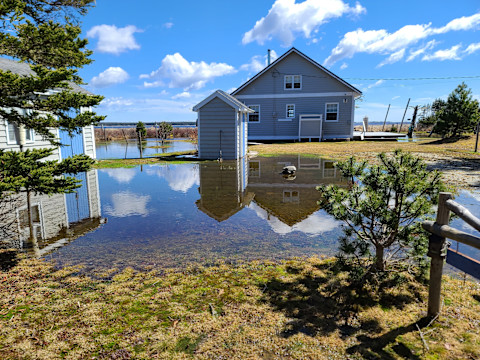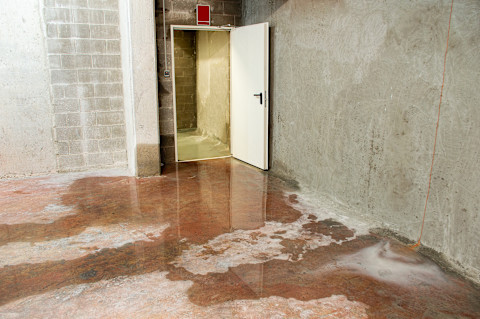Do I Need Overland Water Coverage?
Updated on

Overland Water Coverage Guide
Whether you’re questioning if flood insurance is enough, wondering what overland water coverage is, or curious about the average insurance payout for water damage, here is everything you need to know.
In this article, we will cover the following topics:
- What is Overland Water Coverage?
- What Does Overland Water Coverage Cover?
- Does My Home Insurance Cover Overground Water Damage?
- Average Insurance Payout for Water Damage
- How to Make an Insurance Claim for Water Damage
- How to Get Advice for Overground Water Damage Cover
- Find Water Damage Professionals on HomeStars
- FAQs Common Questions
What is Overland Water Coverage?
Overland water coverage protects your home from damage caused by water entering from outside of your house. This could be due to heavy rains, or even in spring when ice melts.
Benefits of overland water damage cover:
Protects your home from costly damage caused by surface water flooding from rain, rivers, or melting snow.
Covers damage when water enters through your foundation, windows, or doors.
Helps with repairs to your home’s structure and belongings, especially expensive basement damage.
Often includes sewer backup protection for broader coverage.
HomeStars Tip: It can be hard to know what kinds of cover you need! Be sure to review your existing insurance policy to see if overland water coverage is already included, or if it needs to be added as a separate type of insurance coverage.
What Does Overland Water Coverage Cover?

It can be difficult to know if you need overland water damage at first, because it really depends on what area you live in. Overland water coverage is designed to protect against a few different situations where water damage happens.
It can help to stop you from paying for water damage costs, especially in situations when you can’t prevent it from happening.
Here's what overland water coverage typically includes:
Flooding from heavy rains: Protection against water entering your home due to intense rainfall. Spring melting: Coverage for water damage resulting from rapid snowmelt during spring. Overflowing water bodies: Safeguards against water encroachment from rivers, streams, or lakes that overflow onto your property. Storm surges: In some cases, protection might extend to damage from severe storms causing water entry.
If you are not sure where you live needs overground water coverage, you can talk to a professional and get the advice you need on HomeStars. It only takes a few clicks to post your job today.
Does My Home Insurance Cover Overground Water Damage?
Standard home insurance policies can often cover certain incidents of water damage, but it depends on the type. It usually only covers it when it comes from inside the property, so you may need to get extra overground damage cover.
What’s usually covered:
Most home insurance policies cover sudden water damage caused by burst pipes, accidental overflows, or unexpected leaks from plumbing systems.
Accidental water-related events inside the home, like an overflowing bathtub or sink, are often included.
What’s typically not covered:
Damage from overland flooding (water coming in from outside, like heavy rain or river overflow) usually requires separate overland water coverage.
Slow or long-term water damage caused by poor maintenance, such as groundwater seepage or gradual leaks, is typically excluded.
HomeStars Tip: Supplementary coverage like overland water insurance or sewer backup endorsements may be needed to cover additional risks. Ensure you assess your property’s specific risks and consult your insurance provider to clarify any potential gaps in coverage.
Average Insurance Payout for Water Damage

When it comes to water damage insurance payouts, several things can affect how much you might receive. These include how bad the damage is, the details of your insurance policy, and your chosen deductible.
On average, payouts usually range from a few thousand pounds up to tens of thousands, depending on the severity and location of the damage.
Typical claims cover the cost of fixing structural damage, replacing damaged belongings, and restoring your home.
How to Make an Insurance Claim for Water Damage
When you are faced with water damage, knowing how to submit your insurance claim can help you relax knowing you will get the help you need.
Here is a step-by-step guide to making a successful claim:
Document the damage: Take clear photos and videos of the affected areas and any belongings for evidence. This documentation is crucial for your claim submission.
Notify your insurer immediately: Contact your insurance provider as soon as possible to report the water damage. Providing detailed information can help make it go faster.
Prevent further damage: Implement temporary repairs, if possible, to stop additional damage. Keep receipts of any expenses incurred for these temporary fixes as they may be reimbursable.
Provide detailed information: Complete all necessary forms with accurate details of the damage, accompanied by your documentation.
Follow Up Regularly: Stay in contact with your insurer to track the status of your claim and offer any additional information or documentation they might require.
How to Get Advice for Overground Water Damage Cover
Understanding your home insurance can be tricky, but it’s important to make sure your property is properly protected.
Talking to insurance experts can help you get useful advice tailored to your needs so you can pick the right policy with confidence. HomeStars-Tip: Don’t just rely on insurance agents, you can also talk to independent consultants for unbiased advice. Posting your questions on places like HomeStars can get you in touch with professionals quickly, who know your area well too.
Find Water Damage Professionals on HomeStars
It can be difficult to know where to start when it comes to protecting your home from all sorts of damage. MyBuilder makes it easy for you to get in touch with insurance professionals in your area. Simply post your job from home today, then get peace of mind that you have all the right cover.
FAQ: Common Questions Readers Ask About Overground Water Damage Cover
How can overland water coverage protect my home in case of a flood?
Overland water coverage protects your home by compensating for the damage caused by water flowing over land, entering the property through doors, windows, or other openings. This coverage can help repair or replace damaged walls, flooring, and personal belongings within the policy's limits, offering critical financial support in the event of a flood related to a heavy rainstorm or river overflow.
What are the main benefits of having overland water coverage in my insurance policy?
The main benefits of overland water coverage include providing financial peace of mind and security against one of the most common natural disasters affecting homes. It offers protection against unexpected expenses, covers a range of water damage scenarios not typically included in standard policies, and ensures a quicker recovery after flood events, thereby enhancing the overall resilience of your property.
What factors influence the average insurance payout for water damage claims?
Several factors influence the payout for water damage claims, including the extent and severity of the damage, the specifics of the insurance policy in terms of coverage limits and deductibles, and the causes of the water damage. Additionally, the homeowner's ability to provide thorough documentation and timely reporting of the incident can significantly affect the claims process and the final payout.
How do I determine if I need overland water coverage for my property?
To determine if you need overland water coverage, evaluate your property's risk factors, such as proximity to rivers or flood-prone areas, and the region's history of heavy rainfall events. Additionally, consider consulting with your insurance provider or local risk assessment bodies for a tailored evaluation of your need for such coverage.
What steps should I take to ensure my home is adequately protected against flooding?
To protect your home against flooding, consider the following steps: install flood barriers, seal basement walls and ensure proper drainage systems, see this drainage cost guide for more information.
Can I add overland water coverage to my existing flood insurance policy?
Yes, overland water coverage can typically be added to existing home insurance policies as an endorsement or rider. It's essential to discuss this option with your insurance provider to understand the specific terms, costs, and coverage limits associated with adding overland water coverage to your policy.
Related questions on Ask a pro
See what others are asking our expert pros. Browse all questions
Air conditioning
Humidifier + Thermostat
Norman Dewar 02/01/2026 - 4:39 PM
I want to replace my bypass humidifier and thermostat with something that performs better, and has an outdoor connect for automatic control. My house it 2000 square feet. Do you have any recommendations for the products to use?
2 answers
Air conditioning
AC Unit Out
Anonymous user 24/11/2025 - 8:49 AM
My AC unit has gone out in the middle of winter, should I fix now or later?
7 answers
Air conditioning
How to clean your AC machine
Emmanuel Red 04/11/2025 - 9:11 AM
How to clean your AC machine
1 answer
Need expert advice?
Ask a questionDiscuss your job with pros so they can accurately estimate the cost.